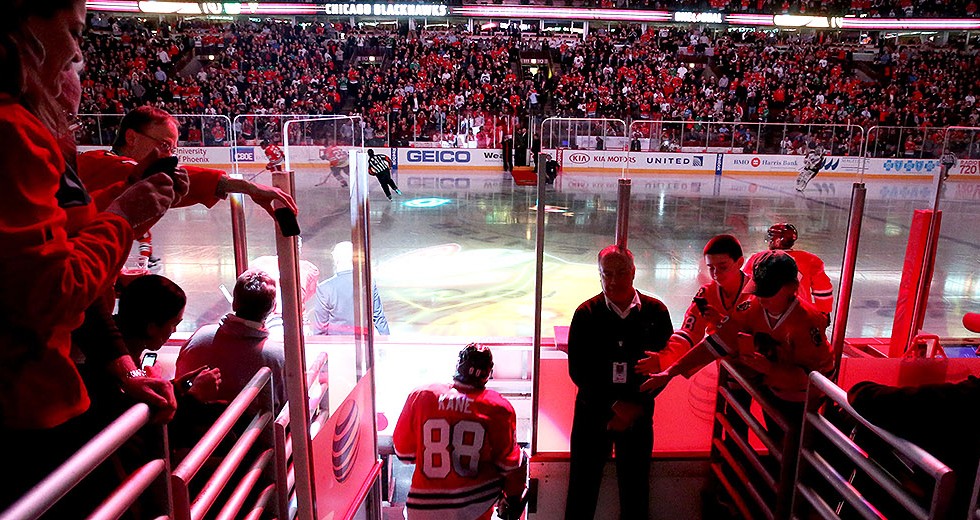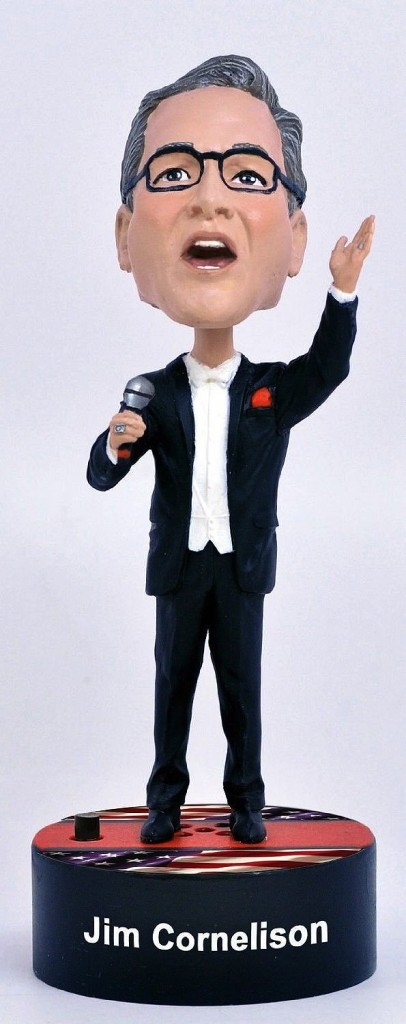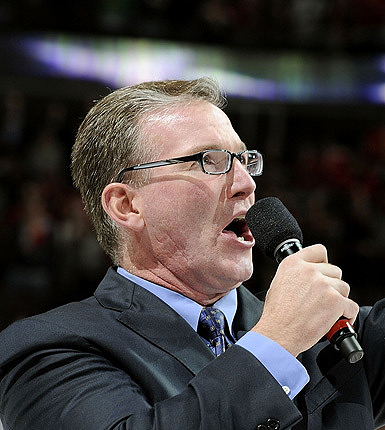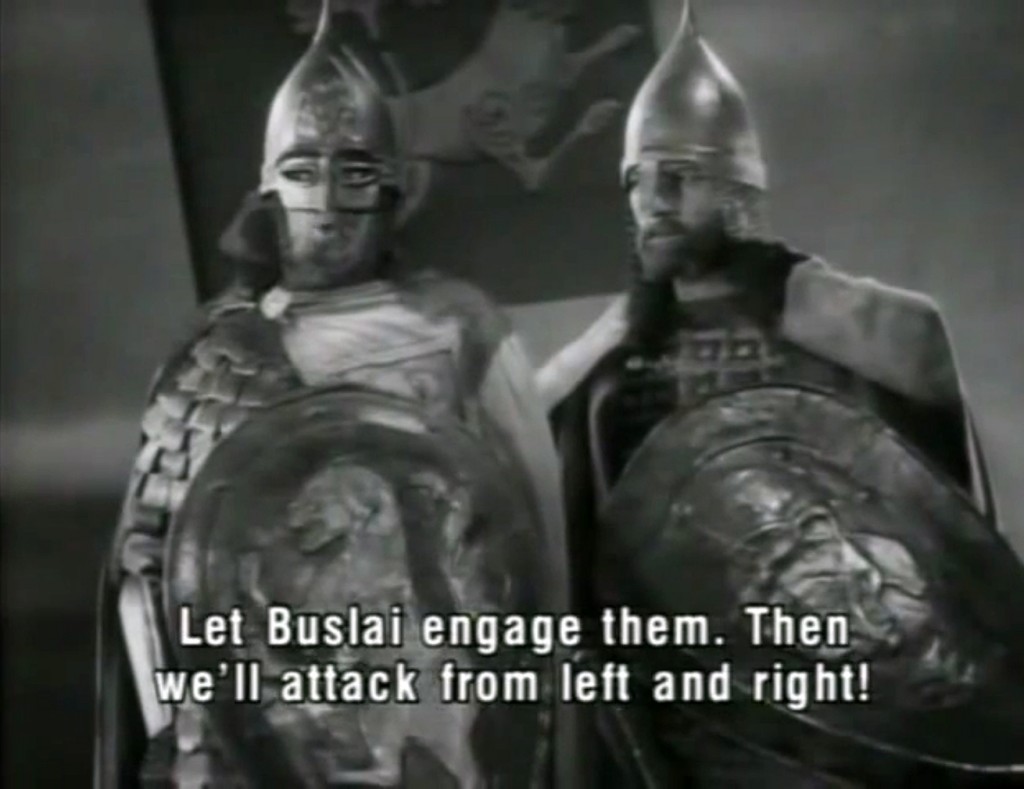
Thousands gather beneath the flags of two great nations. They have clashed across generations. Today, perhaps, is decisive.
Bright rays pierce the darkness. Helmets, row after row, scatter the light. There’s the sharp, abrupt sparkle of polished blades. Images calculated and familiar — strength and anticipation, conflict and consequence.
The proud anthems of two tongues are pitched at shouting hordes. Songs that swell in urgency. The fight is now.
“The Battle on the Ice”
Who’s your Sergei? Prokofiev? Eisenstein? Or Gonchar?
Sergei shapes the battle.
Quick cuts and huge crowds dominate director Sergei Eisenstein’s Soviet cinematic landmark “Alexander Nevsky” (1938), a warrior paean rallying the Russian people for military ascendancy. Composer Sergei Prokofiev marshals huge choral and orchestral forces for the film’s soundtrack, which he later refashioned as the cantata Alexander Nevsky. (Riccardo Muti and the Chicago Symphony Orchestra will perform the work Jan. 22-24 at Orchestra Hall and Feb. 1 at Carnegie Hall. Muti also introduces a free screening of Eisenstein’s film on Jan. 20 at Orchestra Hall.)
Meanwhile, in a National Hockey League contest last month at the United Center, veteran Russian defenseman Sergei Gonchar of the Montreal Canadiens evens a different icy fight midway through the second period, as he nets his only goal so far this season. His visiting team is tied with the hometown Chicago Blackhawks.
Wherever Chicago’s battles on the ice unfold — on stage and screen at Symphony Center or between the boards at the United Center — victory on the frozen pond means everything.
Prokofiev and Eisenstein’s medieval rink is frigid Lake Peipus, and the game day is April 5, 1242: in an “Original Two” German-Russian showdown, invading Teutonic Knights face off against Nevsky Novgorodians defending home ice — that is, the frozen border between present-day Estonia and Russia.
In 1938, lebensrauming Germans were tossing Eastern Europe plenty of sharp elbows, too. Prokofiev’s music and the film’s overt patriotism — “Arise, people of Russia” remains one of cinema’s epic battle cries — foretell a devastating Soviet struggle to stem the Nazi tide.
There are no subtleties in the sounds and images of “Alexander Nevsky” — Prokofiev’s massed chorus surges when Eisenstein packs troops at the blue lines, flags unfurled, for the ultimate pregame stare down.
“I think that an anthem is, by definition, a song of the people — which sounds very post-Bolshevik revolution,” says Jim Cornelison, a classically trained tenor who knows his hockey, too. Even today “the Russian anthem, you always hear it sung as a chorus,” a reminder “how unifying an anthem can be and how powerful it can be, as a voice or an expression of a people.”
It’s not an easy language. “With the Russian, boy, they’ve got some prepositions in places you never thought they would be, and it takes a lot of work just to unravel,” Cornelison observes. “There are some vowel sounds and a couple consonant sounds that just don’t exist in the Romance languages, so it’s much harder.”
Fortunately Cornelison, perhaps Chicago’s most visible vocalist, excels in French, and as hockey fans know, he owns the one American anthem that matters. At every home game, the Blackhawks feature a tenor soloist (which Prokofiev’s Alexander Nevsky curiously omits) consecrating hockey’s cold combatants. For the December contest, the Montreal Canadiens’ once-a-season visit occasions his “Terre de nos aïeux” version of “O Canada.”
Then Cornelison, the Blackhawks’ official National Anthem point man, sings “The Star-Spangled Banner” to/at/with/against a United Center crowd of 22,087 (speaking of “prepositions in places you never thought”), fans noisily pounding the Plexiglas boards. December’s “Original Six” matchup against Montreal probably forgives French-Canadian expansionist ambitions that, in 1673, sent fur fetchers Louis Jolliet and Jacques Marquette scurrying across Lake Michigan, but generations of rivalry still haunt every Hawks-Habs meeting.
Cornelison appreciates the histories behind hockey’s and music’s vendettas. He lived by the sword at Lyric Opera of Chicago, where, in 2000 as the knight Melot, he high-sticked titular heldentenor Ben Heppner in Richard Wagner’s Tristan und Isolde. Heppner, of course, got the joke — “These serious Canadian musicians are hockey fans.”
In 2001, Cornelison also fought “The Fall of Troy,” from Hector Berlioz’s Les Troyens, in memorable CSO performances with guest conductor Zubin Mehta. The tenor keeps a similarly valorous wish list if the orchestra comes calling again (he hopes not on game nights).
Act I of Walküre would be fantastic. “I’d love to do that in concert,” he says. “I just love that music. And then the Verdi Requiem I’ll take on any day. Love it. Any of that kind of big tenor stuff — it’s just a lot of fun to sing. And I still pull out an opera score every once in a while. Kinda my test is to sing through Act III of Lohengrin. … It’s gotten easier as I’ve gotten older.”

Jim Cornelison, official National Anthem singer for the Chicago Blackhawks, has his own bobblehead, available at jimcornelison.com.
He remembers singing at Symphony Center. “You’ve got a huge orchestra on stage, you’re standing right in front of it and behind that, you’ve got this massive chorus, and you’re singing in the middle in just a tremendous amount of sound,” realizing “you cannot outshout that many people and you have to stay within your abilities.”
Just like at the United Center. “It’s just so, so loud that often I cannot hear myself at all. I’ve learned there’s no way to beat the crowd. You just can’t do it. It’s very much the same kind of experience. You stay within yourself.”
Beyond Cornelison’s “O Canada” and “Star-Spangled Banner,” the Blackhawks’ other musical offerings hardly amount to a warrior’s cantata. Every pause in the action triggers over-amped, heavy-metal fist pumpers like Avenged Sevenfold’s “This Means War” (“Walk the razor’s edge/Cut into the madness”), angry oldies like Led Zeppelin’s “Immigrant Song” (“Whisper tales of gore/Of how we calmed the tides of war/We are your overlords/Ah, ah, ahh — ah!” [repeat until puck drops]) or nondescript jingles rushing animated candy around the videoboard’s “Great Gummi Race” (it’s Sour Gold Bear at the wire).
Instead, the amused Cornelison suggests, maybe “you do ‘The Battle on the Ice’ [from ‘Alexander Nevsky’]. I was watching this, and I thought to myself, ‘Wow, I wonder if the Blackhawks could see this and incorporate it into one of their pregame videos somehow — the guys charging at each other.’
“I guess hockey is a sports metaphor for that battle on the ice.”
“The Field of the Dead”
In Alexander Nevsky, as a young woman laments fallen heroes entombed in frozen shards, Prokofiev lets a mezzo-soprano lend Lake Peipus’ frigid battle the meaning and coherence that Zeppelin overlords and sour gummis can’t offer over on Madison Street. (If the ice breaks open at the United Center, there’s little worry beyond a wet basketball court.) “The Field of the Dead” gives Alexander Nevsky its solemn reckoning, a prescient reflection on past sacrifice and the coming toll that a Second World War will surely demand.
The World War I-era poem “In Flanders Fields” provides a similarly mournful inspiration: “To you from failing hands we throw/The torch; be yours to hold it high.” Those words have long adorned the Montreal Canadiens’ home dressing room. Hockey has fallen warriors, too, and at this December contest, ebullient Blackhawks fans are reverentially silent in memory of Canadiens rival Jean Béliveau, a 10-time Stanley Cup victor who had recently passed away.
Few Chicago battles on the ice resonate like Game Seven of the 1971 Stanley Cup Finals, when Béliveau captained the Habs squad that fought back from a 2-0 deficit late in the second period, nabbing the Cup from living Blackhawks legends Bobby Hull, Stan Mikita and Tony Esposito. There’d be no Loop victory rally that season. Desperate for anything to cheer their defeated city, Chicagoans instead paraded the CSO and then Music Director Georg Solti across downtown on a float emblazoned “CHICAGO WELCOMES HOME THE WORLD’S GREATEST ORCHESTRA: THE CHICAGO SYMPHONY,” capping its landmark European tour.
“I just saw Bobby Hull the other day,” Cornelison says. “Bobby says he goes to the opera sometimes. He really likes it — which, of course, I had no idea. I used to think there was no connection between the two worlds, but it’s not true.”
“Alexander’s Entry Into Pskov”
Sergei Eisenstein and Sergei Prokofiev deliver the “in your face!” triumph that defenseman Sergei Gonchar can’t grant Montreal against the Blackhawks. The film’s finale slams its audience with a flourish of five-for-fighting anger that deserves director and composer bench seats in the penalty box. The Russian choral horde lets the irregular prepositions fly, lest the film’s partisan audience somehow miss the cinematic import. What say the Pskovian people when their hero arrives?
In our native Russia, let no foe exist.
Let no foe see our Russian villages.
Whoever invades Russia will be killed.
And that’s just the women’s chorus.
Back at the United Center, defenseman Gonchar might have brought the Habs even, 2-2, in the second period; late in the third, a frustrating 3-3 tie persists. The Blackhawks have 30 seconds remaining this icy December night.
Seabrook pushes the rebound
To Kane, center ice.
To Toews, on the Canadien line.
To Saad, left-wing side.
To Kane, in the slot.
Shoots!
Deflected for the rebound …
What song of the people does the Chicago crowd unleash on its vanquished Canadian foe?
At the United Center, and at Symphony Center, victors on the ice are mightily celebrated.
Andrew Huckman is a Chicago-based lawyer and writer.
TOP: At the United Center, the Chicago Blackhawks’ Patrick Kane readies for the battle on ice. | Todd Rosenberg Photography

